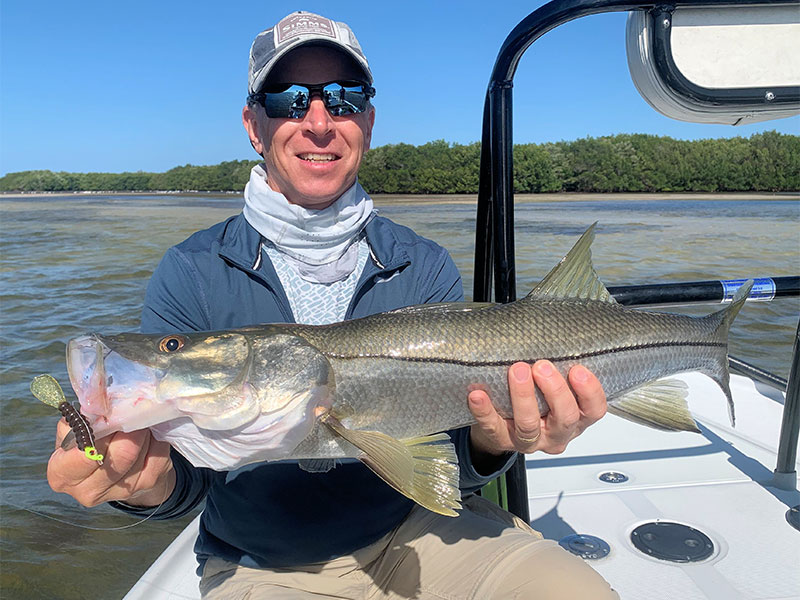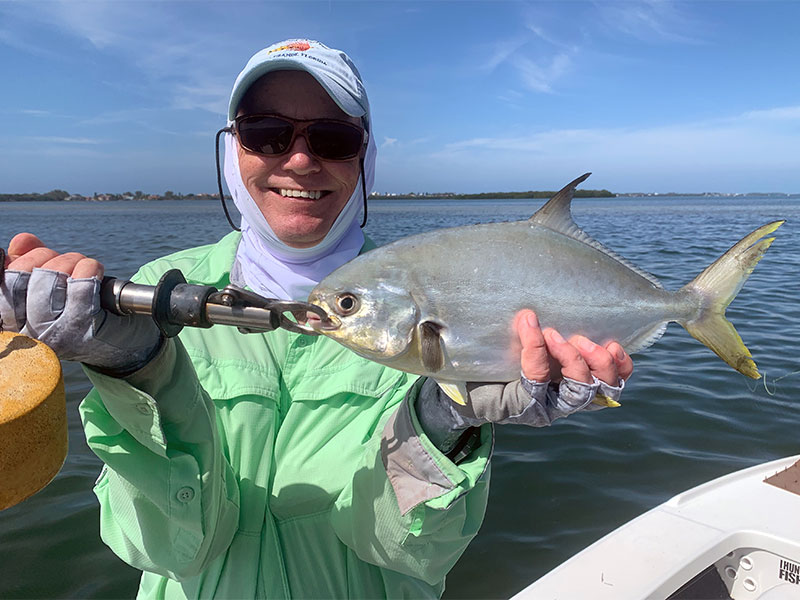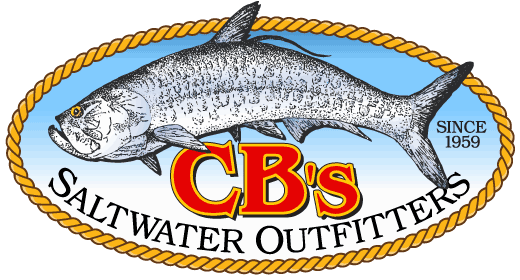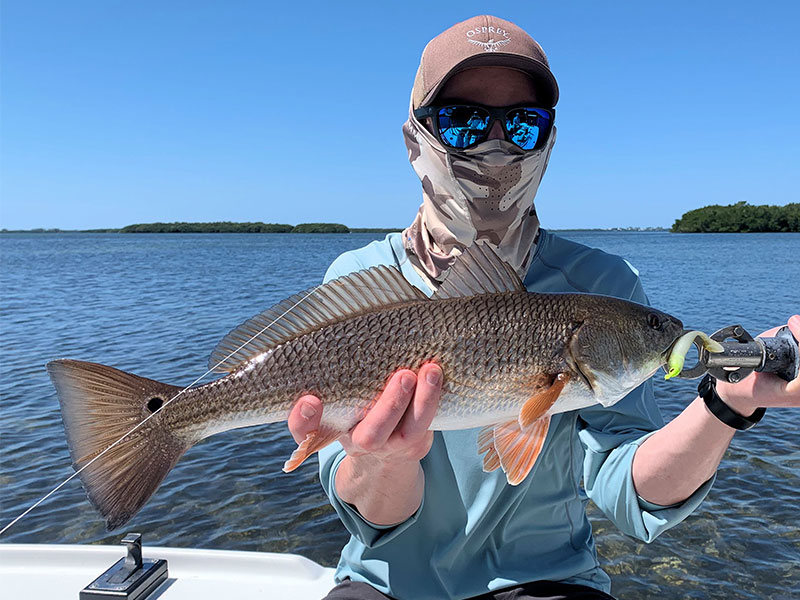There should be good action with reds, trout and snook in skinny water in March as baitfish become more plentiful. Look for Spanish and king mackerel, cobia, tripletail and false albacore (little tunny) in the coastal gulf. Night snook fishing in the ICW should also be a good option this month.
Regulations have returned to normal for reds and snook in Sarasota, except snook remains closed to harvest in the Charlotte Harbor area. Spotted Seatrout have changed in southwest Florida to a 3 fish per person, bag limit and a 6 fish boat limit. Trout must be from 15″-19″ with one allowed per vessel over 19″. Full regulations and details for all species can be viewed at www.myfwc.com.
This should be a good month for snook fishing at night around lighted docks and bridge fenders in the ICW. Small white flies, like my Grassett Snook Minnow, usually work well at night since glass minnows are the predominate baitfish. Focus on shadow lines where light meets dark and fish strong tides for the best action.
Although snook may also be found in rivers, creeks or canals in March, they will also start to move onto shallow flats, particularly on sunny afternoons when it’s warm. I like wider profile flies, like my Grassett Flats Minnow, Deceivers and EP flies, for snook on the flats.
Look for early season tarpon that may start to show in backcountry areas. These are usually adult resident fish that are making their way out of rivers and creeks. They may be “laid up” or rolling on deep grass flats, on edges of shallow flats or along bars when it is calm. An accurate cast may result in an explosive strike! Look for them in areas of lower Tampa Bay or in Gasparilla Sound on some of the same deep grass flats where you find trout.
Reds should be more active as the water warms and baitfish become more plentiful. Higher tides, as we head into spring, will allow them to spend more time feeding in shallow water. Look for them over shallow grass, along mangrove shorelines and around oyster bars when the tide is high. You should find them in potholes and along sand bars when the tide is low. Fly anglers should score with my Grassett Flats Minnow fly, fished on a 12’ or longer leader. When using a long leader be sure you are able turn it over, otherwise you’ll need to shorten it until you can. The butt section should be at least 50% of the total length of the leader and stiff enough to transfer energy from your fly line to the leader.
You might also find reds around docks when the tide is low. Look for deep water under docks with a good tidal flow for the best action. A clear intermediate sink tip fly line with a weighted fly and a 6’ leader should work well for dock fishing. In addition to reds, you might find snook, flounder, sheepshead, jacks and more around docks.
You may find big trout in skinny water in many of the same places that you find reds. Blind cast seams where grass meets sand or focus on light colored bottom, in potholes on top of sand bars, where you may be able to sight fish them. I release all big trout (over 19”), since they are usually females that are often filled with roe. These big fish are important to the health of our fishery.
You should also find trout plentiful on deep grass flats along with Spanish mackerel, blues, flounder or pompano. I like to make a series of drifts, casting ahead of the drift with an Ultra Hair Clouser fly tied on a long shank hook and fished on a clear intermediate sink tip fly line to locate fish. Also look for birds, bait showering out of the water or boils on the surface that will indicate fish feeding below. When mackerel and blues are around, you may need to add 6” of 40# to 60# fluorocarbon or wire to your leader.
Fly poppers also work well when blues and mackerel are around and may help locate them by attracting them from further away. Flounder may be found on sand or mud bottom areas on both shallow and deep grass flats or around docks. Pompano may skip on the surface when you drift or run past them, giving their location away. Fish deep grass flats with a mixture of grass and sand and a strong tidal flow for the best action.
You may also find Spanish or king mackerel, false albacore (little tunny), cobia or tripletail in the coastal gulf this month. Look for diving or hovering terns to find Spanish mackerel or false albacore feeding on the surface. Small white flies, like my Grassett Snook Minnow or Ultra Hair Clousers fished on an intermediate sink tip fly line, will work well for them.
Run crab trap lines at various depths to find tripletail or cobia around crab trap floats. Fly anglers should score on tripletail with lightly weighted flies with weed guards. I like a shrimp pattern for tripletail. Cobia may also be swimming on the surface as they migrate from south to north following warmer water and baitfish. Large, wide profile flies, like Deceivers or EP flies would be good fly choices for cobia.
In the absence of any fish on the surface, check out one of the many artificial reefs or natural hard bottom areas that may hold baitfish and predators. Drift over structure and cast weighted flies on fast sinking fly lines to get deeper in the water column to catch them.
Conditions are usually good during March and fishing heats up. Flats and night snook fishing are usually good options this month. I like to check the coastal gulf when conditions are good, since you could find something really good happening there.
Our natural resources are under constant pressure from red tides fueled by industrial, agricultural and residential runoff, toxic spills, discharges, freezes, increasing fishing pressure and habitat loss and degradation, please limit your kill, don’t kill your limit!
There should be good action with reds, trout and snook in skinny water in March as baitfish become more plentiful. Look for Spanish and king mackerel, cobia, tripletail and false albacore (little tunny) in the coastal gulf. Night snook fishing in the ICW should also be a good option this month.
Regulations have returned to normal for reds and snook in Sarasota, except snook remains closed to harvest in the Charlotte Harbor area. Spotted Seatrout have changed in southwest Florida to a 3 fish per person, bag limit and a 6 fish boat limit. Trout must be from 15″-19″ with one allowed per vessel over 19″. Full regulations and details for all species can be viewed at www.myfwc.com.
This should be a good month for snook fishing at night around lighted docks and bridge fenders in the ICW. Small white flies, like my Grassett Snook Minnow, usually work well at night since glass minnows are the predominate baitfish. Focus on shadow lines where light meets dark and fish strong tides for the best action.
Although snook may also be found in rivers, creeks or canals in March, they will also start to move onto shallow flats, particularly on sunny afternoons when it’s warm. I like wider profile flies, like my Grassett Flats Minnow, Deceivers and EP flies, for snook on the flats.
Look for early season tarpon that may start to show in backcountry areas. These are usually adult resident fish that are making their way out of rivers and creeks. They may be “laid up” or rolling on deep grass flats, on edges of shallow flats or along bars when it is calm. An accurate cast may result in an explosive strike! Look for them in areas of lower Tampa Bay or in Gasparilla Sound on some of the same deep grass flats where you find trout.

Dave Reinhart, from MA, with a snook he caught and released on CAL jigs with shad tails while fishing Gasparilla Sound with Capt. Rick Grassett in a previous March.
Reds should be more active as the water warms and baitfish become more plentiful. Higher tides, as we head into spring, will allow them to spend more time feeding in shallow water. Look for them over shallow grass, along mangrove shorelines and around oyster bars when the tide is high. You should find them in potholes and along sand bars when the tide is low. Fly anglers should score with my Grassett Flats Minnow fly, fished on a 12’ or longer leader.
When using a long leader be sure you are able turn it over, otherwise you’ll need to shorten it until you can. The butt section should be at least 50% of the total length of the leader and stiff enough to transfer energy from your fly line to the leader.

Ray Hutchinson, from MI, with a pompano he caught and released on Clouser flies while fishing Sarasota Bay with Capt. Rick Grassett on different trip in a previous March.
You might also find reds around docks when the tide is low. Look for deep water under docks with a good tidal flow for the best action. A clear intermediate sink tip fly line with a weighted fly and a 6’ leader should work well for dock fishing. In addition to reds, you might find snook, flounder, sheepshead, jacks and more around docks.
You may find big trout in skinny water in many of the same places that you find reds. Blind cast seams where grass meets sand or focus on light colored bottom, in potholes on top of sand bars, where you may be able to sight fish them. I release all big trout (over 19”), since they are usually females that are often filled with roe. These big fish are important to the health of our fishery.
You should also find trout plentiful on deep grass flats along with Spanish mackerel, blues, flounder or pompano. I like to make a series of drifts, casting ahead of the drift with an Ultra Hair Clouser fly tied on a long shank hook and fished on a clear intermediate sink tip fly line to locate fish. Also look for birds, bait showering out of the water or boils on the surface that will indicate fish feeding below. When mackerel and blues are around, you may need to add 6” of 40# to 60# fluorocarbon or wire to your leader.
Fly poppers also work well when blues and mackerel are around and may help locate them by attracting them from further away. Flounder may be found on sand or mud bottom areas on both shallow and deep grass flats or around docks. Pompano may skip on the surface when you drift or run past them, giving their location away. Fish deep grass flats with a mixture of grass and sand and a strong tidal flow for the best action.
You may also find Spanish or king mackerel, false albacore (little tunny), cobia or tripletail in the coastal gulf this month. Look for diving or hovering terns to find Spanish mackerel or false albacore feeding on the surface. Small white flies, like my Grassett Snook Minnow or Ultra Hair Clousers fished on an intermediate sink tip fly line, will work well for them.
Run crab trap lines at various depths to find tripletail or cobia around crab trap floats. Fly anglers should score on tripletail with lightly weighted flies with weed guards. I like a shrimp pattern for tripletail. Cobia may also be swimming on the surface as they migrate from south to north following warmer water and baitfish. Large, wide profile flies, like Deceivers or EP flies would be good fly choices for cobia.
In the absence of any fish on the surface, check out one of the many artificial reefs or natural hard bottom areas that may hold baitfish and predators. Drift over structure and cast weighted flies on fast sinking fly lines to get deeper in the water column to catch them.
Conditions are usually good during March and fishing heats up. Flats and night snook fishing are usually good options this month. I like to check the coastal gulf when conditions are good, since you could find something really good happening there.
Our natural resources are under constant pressure from red tides fueled by industrial, agricultural and residential runoff, toxic spills, discharges, freezes, increasing fishing pressure and habitat loss and degradation, please limit your kill, don’t kill your limit!




